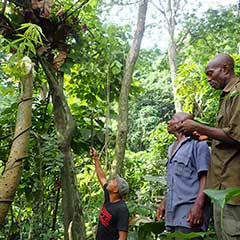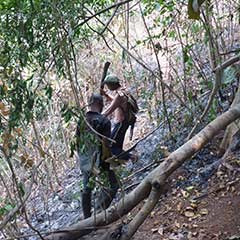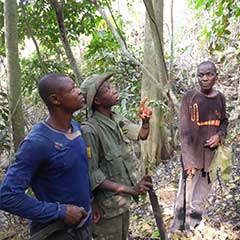With a population estimated to be fewer than 300 individuals, the Cross-River gorilla is the most endangered great ape in Africa. The IUCN lists the Cross-River gorilla as “critically endangered,” meaning the species is considered to be facing an extremely high risk of extinction in the wild. Endemic only to Nigeria and Cameroon, these gorillas are considered a flagship species for conservation in the region.
Habitat loss is the most significant threat to Cross-River gorillas, primarily due to the conversion of forested land to agricultural or grazing land. The gorilla's habitat is also surrounded by some of the most densely settled human areas in the region, and the human population continues to increase. Other threats include poaching, disease and lack of management of protected habitat.
Afi Mountain Wildlife Sanctuary (AMWS) is home to about 10% of the total Cross-River gorilla population. This sanctuary and the surrounding Afi River Forest Reserve constitute one of the largest forest blocks left in Cross-River State, outside of the national park. Due to poor protection and weak management, the sanctuary has undergone a slow but steady decline. Gorilla habitat within the sanctuary is being lost to illegally grown farms, and illegal hunting is widespread.
Zoo New England partners with the Wildlife Conservation Society (WCS) to help strengthen the management and enforcement of protections within AMWS. The WCS program's conservation strategy is based on four key components:
- Protected area management and law enforcement
- Community conservation
- Conservation education and public awareness
- Alternative livelihoods
This work is conducted under the AZA SAFE (Saving Animals From Extinction) program, an initiative led by the Association of Zoos and Aquariums (AZA). The program brings together the expertise and resources of AZA-accredited zoos, aquariums, and conservation organizations to protect endangered species and their habitats.
SAFE funding provides field equipment and supplies, helps improve anti-poaching efforts, and supports the full-time employment of Community Rangers, who play a critical role in the sanctuary’s well-being. Support of anti-poaching planning and monitoring by these rangers has shown to significantly improve law enforcement effectiveness and has gradually reduced hunting within the sanctuary.
Photo: © WCS Nigeria
Zoo New England actively contributes to gorilla conservation through these additional programs and initiatives:
Cell Phone Donations
By recycling your phones at Zoo New England, you help protect animals like western lowland gorillas that live in areas where cell phone materials are mined. Electronic gadgets like cell phones, ipods and tables contain coltan, a mineral extracted from the forests of Africa. Mining for coltan destroys the natural habitat of gorillas and many other species, pushing these animals closer to extinction. Zoo New England has teamed up with Eco-Cell, a company that partners with zoos across the country, to collect your used cell phones to recycle or refurbish them for reuse.
Species Survival Plan
Zoo New England participates in the western lowland gorilla Species Survival Plan. By sharing research and knowledge, participating institutions work together to establish guidelines that best ensure the health of captive populations, and with success, the survival of endangered species.
➤ Visit Franklin Park Zoo to learn more about gorillas and support our conservation efforts.





